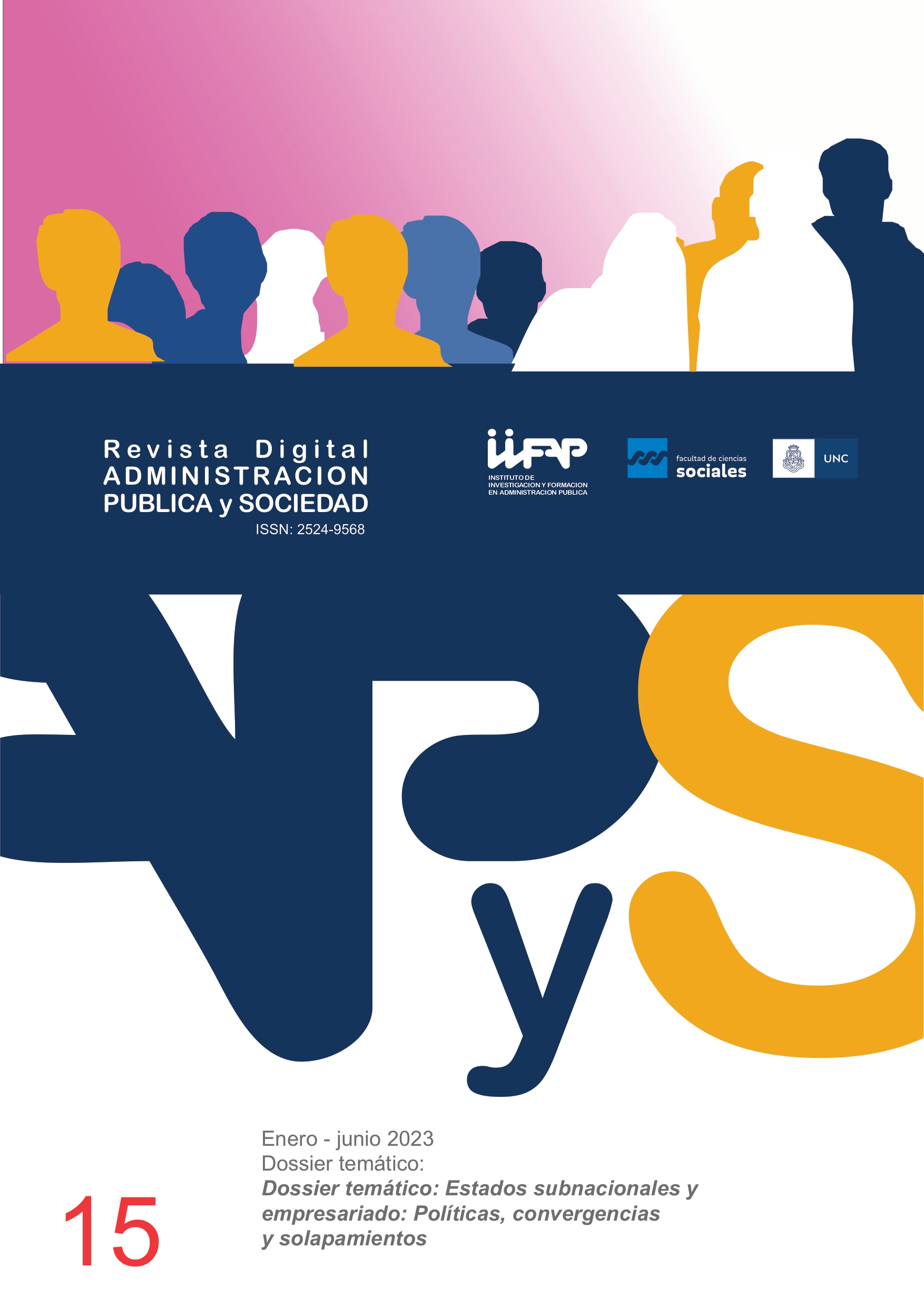Las políticas públicas y su contenido gramatical. Una aproximación al modelo de la gramática de las instituciones desde la política pública local
Conteúdo do artigo principal
Resumo
A análise de políticas públicas constitui um tema que, tradicionalmente, despertou um interesse marcante nos setores especializados e que, por isso, desde cedo motivou diferentes propostas teórico-metodológicas. Inscritos nessa tendência, os instrumentos gramaticais institucionais representam uma contribuição relativamente recente, em que o estudo está estritamente voltado para o exame dos componentes textuais das expressões das políticas públicas. Embora, nos últimos anos, esta abordagem tenha recebido maior atenção dentro do campo relevante, os diferentes aspectos envolvidos na sua implementação ainda admitem maiores níveis de investigação. Considerando isso e tendo em conta a possibilidade de aplicar esta técnica à análise textual de políticas públicas no cenário institucional argentino, este artigo revisa os principais aspectos do desenvolvimento teórico e conceitual do modelo de gramática institucional e formula uma série de sugestões específicas para sua implementação com base no exame de instrumentos de política pública provincial selecionados.
Detalhes do artigo

Este trabalho está licenciado sob uma licença Creative Commons Attribution-NonCommercial-ShareAlike 4.0 International License.
Los autores/as que publiquen en esta revista, aceptan los siguientes términos de la política de derechos de autor:- Los autores/as conservarán sus derechos de autor (esto incluye el copyrigth) y garantizarán a la revista el derecho de primera publicación de su obra, el cuál estará simultáneamente sujeto a la Licencia de reconocimiento de Creative Commons: No se permite un uso comercial de la obra original ni de las posibles obras derivadas, la distribución de las cuales se debe hacer con una licencia igual a la que regula la obra original.
- Los autores/as podrán adoptar otros acuerdos de licencia no exclusiva de distribución de la versión de la obra publicada (p. ej.: situarlo en un repositorio institucional o publicarla en un libro) siempre que se indique la publicación inicial en esta revista.
- Se permite y recomienda a los autores/as difundir su obra a través de Internet (p. ej.: en repositorios institucionales o en su página web) luego del proceso de publicación, lo cual puede producir intercambios interesantes y aumentar las citas de la obra publicada. (Véase El efecto del acceso abierto).
Como Citar
Referências
ANGULO-CÁZARES, Reynaldo. (2018). Problemas de agencia en la educación básica en México: un diagnóstico institucional. Convergencia Revista de Ciencias Sociales, 77, 149-173.
ATLAN, Henri. (1990). Entre el cristal y el humo: ensayo sobre la organización de lo vivo. Madrid: Debate.
BECK, Ulrich. (1998). La sociedad del riesgo hacia una nueva modernidad. Barcelona: Paidós.
BENEDETTI, Álvaro. (2017). El marco de análisis y desarrollo institucional (IAD), una herramienta de análisis de políticas públicas. Estudio del caso Agro Ingreso Seguro (AIS). Estudios Políticos, 50, 138-158.
BLACK, Max. (20|16). Modelos y metáforas, Madrid: Tecnos.
BUSHOUSE, Brenda; SCHWEIK, Charles; SIDDIKI, Saba; RICE, Doug y WOLFSON, Isaac. (2021). The Institutional Grammar: A Method for Coding Institutions and its Potential for Advancing Third Sector Research. Voluntas: International Journal of Voluntary and Nonprofit Organizations, primera publicación de modo online, 1-8.
CRAWFORD, Sue y OSTROM, Elinor. (2015). Una gramática de las instituciones. En Elinor Ostrom (Ed.) Comprender la diversidad institucional. México D.F.: Fondo de Cultura Económico, 195-239.
DUNLOP, Claire, KAMKHAJI, Jonathan y RADAELLI, Claudio. (2019). A sleeping giant awakes? The rise of the Institutional Grammar Tool (IGT) in policy research. Journal of chinese governance, 4 (2), 163-180.
EASTON, David. (2013). Esquema para el análisis político [3ra ed.]. Madrid: Amorrortu.
FRANTZ, Christopher y Siddiki, Saba. (2022). Institutional Grammar. Foundations and Applications for Institutional Analysis. Londres: Palgrave Macmillan.
KISER, Larry y OSTROM, Elinor. (1982). The Three Worlds of Action: A Metatheoretical Synthesis of Institutional Approaches. En Elinor Ostrom E. [Ed.] Strategies of Political Inquiry. USA: Sage, 179-222.
OSTROM, Elinor. (2007). Institutional Rational Choice: An Assessment of the Institutional Analysis and Development Framework. En Paul Sabatier [Ed.] Theories of the Policy Process. Cambridge, MA: Westview Press, 21- 64.
OSTROM, Elinor. (2015). Comprender la diversidad institucional, México D.F.: Fondo de Cultura Económico. [Primera edición en inglés: Ostrom, E. (2005). Understanding Institutional Diversity. New Jersey, USA: Princeton University Press].
OSTROM, Elinor. y BASURTO, Xavier. (2010). Crafting Analytical Tools to Study Institutional Change. Journal of Institutional Economics, 7(3), 317–343.
OSTROM, Elinor y CRAWFORD, Sue. (1995). A Grammar of Institutions. The American Political Science Review, 89 (3), 582-600.
OSTROM, Elinor. (2009). Las reglas que no se hacen cumplir son pura palabrería. Revista de Economía Internacional, II (21), 15-24.
PRINCE, Alejandro; JOLIAS, Lucas y FINQUELIEVICH, Susana. (2013). Un modelo analítico de ciudad del conocimiento para América Latina. En Tamara Tania Cohen Egler, (Org.) Digitalização do Território. Rio de Janeiro: Letra Capital, 179-207.
RICE, Doug; SIDDIKI, Saba; FREY, Seth.; KWON, Jay y SAWYER, Adam. (2021). Machine coding of policy texts with the Institutional Grammar. Public Administration, 99 (2), 248–262.
SÁNCHEZ OROZCO, Víctor y VERDUZCO CHÁVEZ, Basilio. (2015). Preferencias institucionales y organización de los cuerpos de seguridad. En: Basilio. Verduzco Chávez (Coord.) Cada quien su imperio: preferencias institucionales y patrones territoriales de inseguridad. Guadalajara: Edición Universitaria, 79 – 104.
SÁNCHEZ-CUENCA, Ignacio. (2004) Teoría de juegos. Madrid: Centro de Investigaciones Sociológicas.
SIDDIKI, Saba y LUPTON, Suzann. (2016) Assessing Nonprofit Rule Interpretation and Compliance. Nonprofit and Voluntary Sector Quarterly, 45 (4), 156S-174S.
SUBIRATS, Joan; KNOEPFEL, Peter; LARRUE, Corinne y VARONE, Frédéric. (2008). Análisis y gestión de políticas públicas. Barcelona: Ariel.
VALLÉS, Josep Maria. (2007). Ciencia Política. Una Introducción, Barcelona: Ariel.

